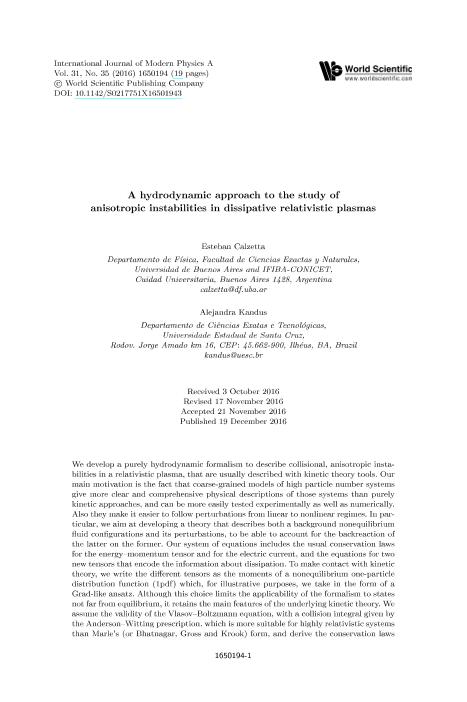Artículo
A hydrodynamic approach to the study of anisotropic instabilities in dissipative relativistic plasmas
Fecha de publicación:
12/2016
Editorial:
World Scientific
Revista:
International Journal of Modern Physics A
ISSN:
0217-751X
Idioma:
Inglés
Tipo de recurso:
Artículo publicado
Clasificación temática:
Resumen
We develop a purely hydrodynamic formalism to describe collisional, anisotropic insta-bilities in a relativistic plasma, that are usually described with kinetic theory tools. Ourmain motivation is the fact that coarse-grained models of high particle number systemsgive more clear and comprehensive physical descriptions of those systems than purelykinetic approaches, and can be more easily tested experimentally as well as numerically.Also they make it easier to follow perturbations from linear to nonlinear regimes. In par-ticular, we aim at developing a theory that describes both a background nonequilibriumuid congurations and its perturbations, to be able to account for the backreaction ofthe latter on the former. Our system of equations includes the usual conservation lawsfor the energy{momentum tensor and for the electric current, and the equations for twonew tensors that encode the information about dissipation. To make contact with kinetictheory, we write the dierent tensors as the moments of a nonequilibrium one-particledistribution function (1pdf) which, for illustrative purposes, we take in the form of aGrad-like ansatz. Although this choice limits the applicability of the formalism to statesnot far from equilibrium, it retains the main features of the underlying kinetic theory.Weassume the validity of the Vlasov{Boltzmann equation, with a collision integral given bythe Anderson{Witting prescription, which is more suitable for highly relativistic systemsthan Marle´s (or Bhatnagar, Gross and Krook) form, and derive the conservation laws by taking its corresponding moments. We apply our developments to study the emer-gence of instabilities in an anisotropic, but axially symmetric background. For smalldepartures of isotropy we nd the dispersion relation for normal modes, which admitunstable solutions for a wide range of values of the parameter space
Palabras clave:
Plasmas
,
Inestabilidades
,
Magnetohidrodinamica
Archivos asociados
Licencia
Identificadores
Colecciones
Articulos(IFIBA)
Articulos de INST.DE FISICA DE BUENOS AIRES
Articulos de INST.DE FISICA DE BUENOS AIRES
Citación
Calzetta, Esteban Adolfo; Kandus, Patricia; A hydrodynamic approach to the study of anisotropic instabilities in dissipative relativistic plasmas; World Scientific; International Journal of Modern Physics A; 31; 35; 12-2016; 1-19
Compartir




